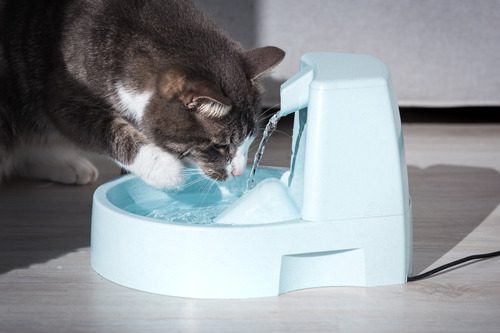Cat Dehydration: Signs, Symptoms, and Treatments
Cats are known for their independent nature and often stoic demeanor, but they rely on attentive pet owners to recognize when something might be wrong. One critical yet often overlooked issue is dehydration. Cat dehydration can lead to severe health problems if not addressed promptly. If you suspect your cat is dehydrated, contacting a trusted veterinarian is crucial. Lane Veterinary in Hinsdale, IL, provides compassionate care for cats experiencing dehydration and other health issues. Call (630) 320-6644 to schedule an appointment.

Why Is My Cat Dehydrated?
Dehydration occurs when a cat’s body loses more fluids than it takes in, disrupting normal bodily functions. Cats may become dehydrated for several reasons, and identifying the underlying cause can help guide treatment.
- Inadequate water intake: Some cats are notoriously picky about drinking water, particularly if their water source isn’t appealing or easily accessible.
- Heat or environmental factors: Hot weather or prolonged exposure to warm indoor temperatures can lead to fluid loss.
- Illness or medical conditions: Vomiting, diarrhea, kidney disease, and diabetes often cause dehydration in cats.
- Increased physical activity: Cats that are more active than usual may lose fluids through exertion, especially if they don’t replenish by drinking water.
- Dietary factors: Cats fed primarily on dry kibble without access to wet food may not receive enough moisture from their diet.
What Are Some Signs of Cat Dehydration?
Cats are experts at hiding discomfort, which makes it essential to look closely for dehydration symptoms. Early detection can prevent complications and ensure your cat receives timely care.
- Lethargy or fatigue
- Loss of skin elasticity
- Sunken eyes
- Dry gums or sticky saliva
- Reduced appetite
- Frequent panting
If you notice any of these symptoms, contact Lane Veterinary at (630) 320-6644 for an evaluation.
Diagnosing Cat Dehydration at the Vet
Veterinarians use several methods to diagnose dehydration and identify its severity. An appointment at Lane Veterinary in Hinsdale, IL, ensures a thorough assessment of your cat’s health so we can create a treatment plan tailored to address your cat’s specific needs. Here’s what you can expect:
- Physical examination: Your veterinarian will look for clinical signs like sunken eyes, dry gums, and poor skin elasticity.
- Hydration tests: Specialized tests, such as capillary refill time (CRT), measure the moisture in your cat’s system.
- Bloodwork: Blood tests can reveal electrolyte imbalances and other complications related to dehydration.
- Urine analysis: Concentrated urine may indicate your cat isn’t getting enough fluids.
How Is Cat Dehydration Treated?
Treatment for cat dehydration focuses on replenishing lost fluids and addressing any underlying conditions. The severity of dehydration determines the type of treatment your cat will need.
Mild Dehydration
If dehydration is caught early, your veterinarian may recommend increasing your cat’s water intake through dietary changes or adding water to their food. In some cases, subcutaneous fluids can be administered to provide hydration without a lengthy visit.
Moderate to Severe Dehydration
For more serious cases, intravenous (IV) fluids are often required. IV fluids help restore hydration levels quickly and ensure electrolytes are balanced. Severe dehydration can require hospitalization to monitor your cat’s recovery and address any related health concerns.
Lane Veterinary can provide advanced treatments for cat dehydration, focusing on your pet’s comfort and long-term health. Call (630) 320-6644 to schedule a consultation if your cat needs care.
Tips for Preventing Dehydration in Cats
By making a few adjustments to your cat’s daily routine, you can help them maintain healthy hydration levels.
- Offer fresh water daily in clean bowls. Consider investing in a cat water fountain, which many cats find appealing.
- Adding wet food to your cat’s diet provides an additional source of moisture.
- Place water bowls throughout your home to make hydration more convenient.
- Pay attention to your cat’s behavior, especially during hot weather or periods of increased activity.
- Routine pet exams at Lane Veterinary can help identify potential health problems before they escalate.
Understanding the Long-Term Impact of Dehydration
Chronic dehydration can have serious consequences for your cat’s health. Repeated episodes may lead to kidney disease, urinary tract infections, or other complications. Cats with underlying conditions, such as diabetes or kidney issues, are particularly vulnerable to dehydration-related risks. Being informed about the signs and treatments of cat dehydration equips you to act quickly and seek professional help. If your cat exhibits symptoms of dehydration, Lane Veterinary in Hinsdale, IL, is here to provide compassionate care. Contact us at (630) 320-6644 to schedule an appointment.
Recent Posts
About Us
Choosing a vet means entrusting your pet’s care and well-being to capable hands. Lane Veterinary strives to be a lifetime vet for you and your family, being the people you can always lean on for support and guidance. As a privately owned practice, we stand to give people and their pets the one-on-one care and attention they deserve in a calm and comfortable setting.
